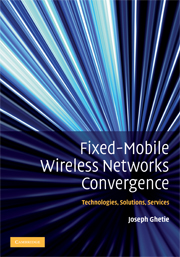Book contents
- Frontmatter
- Contents
- Disclaimer
- How the Book is Organized
- List of Figures
- List of Tables
- Preface
- Acknowledgments
- Acronyms
- Part I Wireless Communications: Networking and Management
- Part II Cellular Mobile Radio Networking and Management
- Part III Fixed Wireless Technologies: Networking and Management
- Part IV Fixed Wireless Cellular Mobile Networks Convergence and Integration
- Part V Fixed Wireless Cellular Mobile Networks Convergence: Standardized Networking Solutions
- Part VI Fixed-Mobile Convergence Services, Industry Trends, and Implementation Issues
- 18 QOS in Fixed Wireless Cellular Mobile Convergent Networks
- 19 The Economics of Fixed Wireless Cellular Mobile Networks Integration
- 20 Fixed-Mobile Convergence Implementation: Status, Trends, and Issues
- References
- Index
20 - Fixed-Mobile Convergence Implementation: Status, Trends, and Issues
from Part VI - Fixed-Mobile Convergence Services, Industry Trends, and Implementation Issues
Published online by Cambridge University Press: 21 August 2009
- Frontmatter
- Contents
- Disclaimer
- How the Book is Organized
- List of Figures
- List of Tables
- Preface
- Acknowledgments
- Acronyms
- Part I Wireless Communications: Networking and Management
- Part II Cellular Mobile Radio Networking and Management
- Part III Fixed Wireless Technologies: Networking and Management
- Part IV Fixed Wireless Cellular Mobile Networks Convergence and Integration
- Part V Fixed Wireless Cellular Mobile Networks Convergence: Standardized Networking Solutions
- Part VI Fixed-Mobile Convergence Services, Industry Trends, and Implementation Issues
- 18 QOS in Fixed Wireless Cellular Mobile Convergent Networks
- 19 The Economics of Fixed Wireless Cellular Mobile Networks Integration
- 20 Fixed-Mobile Convergence Implementation: Status, Trends, and Issues
- References
- Index
Summary
Benefits of Fixed-Mobile Convergence
Throughout this book we analyzed in great detail the technologies behind fixed wireless cellular mobile networks convergence. In doing this, we used the shortened term Fixed-Mobile Convergence (FMC). However, convergence has multiple facets and a long history of expectations, and sometimes marketing hype. The FMC term has been used since the early attempts to integrate voice and data through the convergence of telecommunication and data communications networks. Later, the term was used for the convergence of digitized services such as ISDN. The development of the new wave of land based wireless communications brought the convergence term back as the on-going process of integration of wireless networks and wired networks. Returning to the narrow definition adopted for this book, fixed wireless and cellular mobile networks convergence, we can summarize the goals and benefits of FMC as follows:
Communications anytime, anywhere, using any wireless technology;
Continuous communication and operation regardless of the network used;
Convenience for the user with a single handset and telephone number;
Improved cost/performance factors by automatic selection of the network with highest available bandwidth and lowest cost;
High availability by having multiple networks that can be used for transmission;
Flexibility in the network design by combining indoor and outdoor, and short range and long range communications;
Support for fixed, nomadic and highly mobile users;
Service portability across heterogeneous networks.
The achievement of these goals requires positive answers and solutions in the following areas:
Economics of FMC with adequate Return on Investment;
Standardization of transparent handover operations;
Scalability of convergent architectures which is critical in urban and metropolitan areas;
[…]
- Type
- Chapter
- Information
- Fixed-Mobile Wireless Networks ConvergenceTechnologies, Solutions, Services, pp. 390 - 399Publisher: Cambridge University PressPrint publication year: 2008



